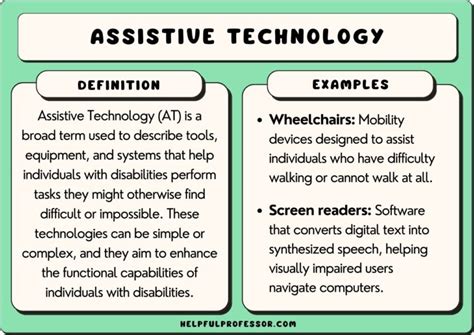Low-tech assistive technology (AT) is a game-changer for individuals with disabilities, seniors, and anyone who needs a little extra support in their daily lives. These simple, yet effective tools can make a significant difference in independence, productivity, and overall well-being. In this article, we'll explore some remarkable low-tech AT examples that can enhance daily life.
What is Low-Tech Assistive Technology?
Low-tech AT refers to simple, non-electronic devices that assist individuals with disabilities, injuries, or illnesses. These tools are often inexpensive, easy to use, and require minimal training. They can be used in various settings, including homes, schools, workplaces, and communities.

Daily Living Aids
Daily living aids are essential for individuals who need assistance with everyday tasks. Here are some examples of low-tech AT that can make a significant difference:
- Reachers and grabbers: These long-handled tools help individuals pick up items from a distance, reducing the need for bending or stretching.
- Adaptive utensils: Modified utensils with larger grips or angled handles make eating and drinking easier for those with limited dexterity.
- Shoe horns: Long-handled shoe horns enable individuals to put on shoes without bending or straining.
Communication Aids
Communication is key to independence, and low-tech AT can facilitate this process. Here are some examples:
- Picture communication symbols: These symbols help individuals with limited verbal skills communicate their needs and wants.
- Alphabet boards: Simple alphabet boards enable individuals to spell out messages and communicate with others.
- Low-tech augmentative and alternative communication (AAC) devices: These devices use pictures, symbols, or letters to support communication.
Organization and Time Management
Staying organized and managing time effectively can be challenging for anyone. Low-tech AT can help:
- Visual schedules: Visual schedules use pictures or symbols to help individuals plan and organize their day.
- Checklists: Simple checklists enable individuals to keep track of tasks and responsibilities.
- Alarms and timers: Low-tech alarms and timers help individuals stay on schedule and remember important tasks.
Mobility and Accessibility
Mobility and accessibility are crucial for independence. Here are some low-tech AT examples that can make a difference:
- Canes and walkers: These mobility aids provide support and stability for individuals with mobility impairments.
- Ramps and lifts: Portable ramps and lifts enable individuals to access homes, buildings, and vehicles safely.
- Transfer boards: Transfer boards facilitate safe transfers between surfaces, such as beds, chairs, or toilets.
Leisure and Recreation
Leisure and recreation are essential for overall well-being. Low-tech AT can enhance these experiences:
- Adaptive recreation equipment: Modified equipment, such as adaptive bikes or sports gear, enables individuals with disabilities to participate in recreational activities.
- Accessible games: Simple, low-tech games can be adapted to meet the needs of individuals with disabilities, promoting social interaction and fun.
- Sensory integration tools: Low-tech sensory integration tools, such as playdough or fidget toys, can help individuals with sensory processing issues.
Gallery of Low-Tech Assistive Technology Examples






Frequently Asked Questions
What is low-tech assistive technology?
+Low-tech assistive technology refers to simple, non-electronic devices that assist individuals with disabilities, injuries, or illnesses.
How can low-tech AT enhance daily life?
+Low-tech AT can enhance daily life by providing support with daily living tasks, communication, organization, mobility, and leisure activities.
Where can I find low-tech AT resources?
+You can find low-tech AT resources online, through assistive technology organizations, or by consulting with healthcare professionals or occupational therapists.
In conclusion, low-tech assistive technology can significantly enhance daily life for individuals with disabilities, seniors, and anyone who needs a little extra support. By exploring these simple, yet effective tools, you can gain independence, confidence, and a better quality of life. Share your experiences with low-tech AT in the comments below, and let's work together to create a more accessible and inclusive world.
